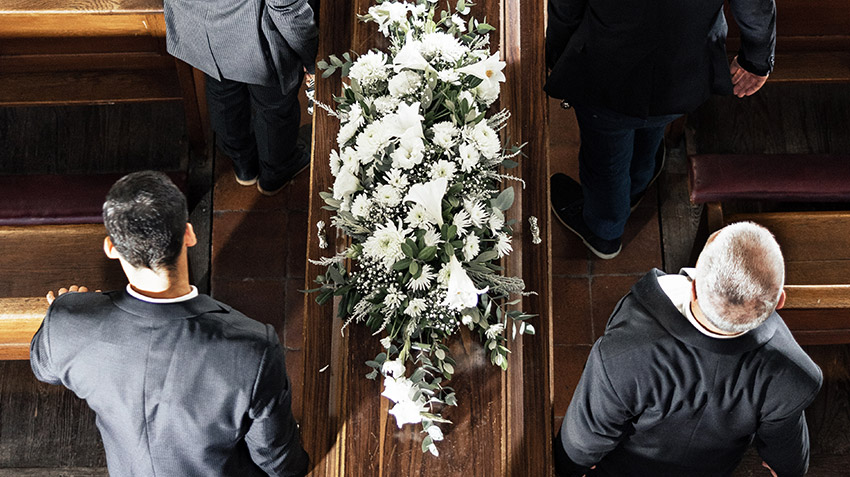
Saying goodbye to a loved one is a deeply emotional experience, and funeral arrangements play a crucial role in honoring their memory.
However, funeral traditions vary widely across cultures, reflecting different beliefs, values, and customs. Understanding these practices can help families plan a farewell that is meaningful and respectful. Whether rooted in religious beliefs, ancestral traditions, or modern adaptations, funerals serve as a way to honor the deceased and support grieving loved ones.
Let’s explore the many different funeral traditions from around the world.
Western Funeral Traditions
In many Western cultures, funerals are typically guided by religious customs and personal preferences.
Christian Funerals
Christian funerals, whether Catholic or Protestant, commonly involve funeral home services, wakes, and memorials. Burial and cremation are both accepted, although preferences vary by denomination. A significant aspect of Christian funerals is the eulogy, where family and friends share memories of the deceased. Religious ceremonies, such as a funeral Mass in Catholicism or a memorial service in Protestantism, offer prayers and scripture readings to comfort the bereaved.
Jewish Funerals
Jewish funerals follow strict traditions emphasizing simplicity and respect for the deceased. Burial typically occurs within 24 hours, and cremation is generally discouraged. Shiva, a seven-day mourning period, allows family and friends to gather in support and remembrance.
Secular Funerals
Non-religious funerals are becoming more common, focusing on celebrating a person’s life rather than religious rituals. These ceremonies often include personalized tributes, music, and reflections.
East Asian Funeral Customs
Funeral arrangements in East Asia are influenced by religious and philosophical traditions such as Buddhism, Confucianism, and Taoism.
Chinese Funerals
In Chinese culture, ancestor veneration plays a central role. Families honor their loved ones through offerings, incense burning, and symbolic gestures. Mourners typically wear white, the color of mourning, and follow specific rituals based on the deceased’s age and social status. The mourning period can extend for weeks or even years, with ceremonies held on specific anniversaries.
Japanese Funerals
Japanese funeral arrangements are deeply influenced by Buddhism. The majority of Japanese people choose cremation, followed by a post-cremation ritual where the family transfers the deceased’s bones into an urn. The wake (otsuya) and funeral ceremony often involve Buddhist chants and prayers. Memorial services continue for years to honor ancestors, reinforcing strong familial bonds.
Buddhist Funeral Traditions
Buddhist funerals emphasize karma and rebirth. Rituals often include chanting, incense burning, and offering food to monks. The focus is on ensuring a peaceful transition for the deceased into their next life.
South Asian Funeral Customs
South Asian cultures follow unique religious customs that shape their funerals.
Hindu & Sikh Funerals
Hindu funerals emphasize the soul’s journey beyond life. Cremation is preferred, as it symbolizes releasing the soul. The “Antyesti” (last rites) include prayers and offerings, often with the ashes scattered in the Ganges River. Sikh funerals focus on reincarnation, with ceremonies centered around community prayer and remembrance.
Middle Eastern & African Funeral Traditions
The Middle East and Africa have diverse funeral customs, often shaped by religious beliefs and community involvement.
Islamic Funerals
Islamic funeral arrangements follow strict guidelines. The deceased is washed (Ghusl), wrapped in a simple white shroud, and buried within 24 hours. Cremation is not permitted. Prayers are offered at the funeral and afterwards in communal gatherings.
African Funerals
African funerals vary by region but often involve extended mourning periods, community gatherings, music, and dance. Urban areas may have modernized services, while rural regions maintain traditional burial customs.
Indigenous & First Nations Funeral Practices
Indigenous cultures emphasize spiritual connections with ancestors and nature.
Māori Funerals (New Zealand)
The Māori observe a tangihanga (funeral rite) that involves days of communal mourning, storytelling, and ceremonial practices. The deceased is usually buried in ancestral land to maintain spiritual ties.
Native American Tribal Customs
Many Native American tribes hold ceremonies that blend spiritual traditions with modern practices. Respect for nature, the use of sacred rituals, and communal support are key aspects of these funerals.
Latin American & Caribbean Funeral Traditions
Latin American and Caribbean funerals are rich in religious and cultural traditions.
Catholic Influence
In many Latin American countries, Catholic funeral traditions include prayer vigils, church services, and community gatherings.
Día de Los Muertos
Mexico’s “Día de los Muertos” (Day of the Dead) is a unique way of honoring the deceased, blending indigenous and Catholic traditions. Families create altars, decorate graves, and hold celebrations to remember their loved ones.
Afro-Caribbean Funerals
In Jamaica and Haiti, funerals often include music, drumming, and communal celebrations, reflecting African spiritual influences.
Modern Funeral Adaptations Across Cultures
With globalization and changing values, funerals are evolving.
Blended Traditions
Multicultural families often combine different customs, creating hybrid ceremonies that honor various heritages.
Sustainable & Eco-Friendly Funerals
Green burials, biodegradable urns, and conservation efforts are becoming more popular as people seek environmentally friendly funeral options.
Personalized Memorials
Modern funerals often include video tributes, online memorials, and digital storytelling, allowing families to honor their loved ones in unique ways.
Always Respect Cultural Differences in Funeral Arrangements
Understanding diverse funerals is essential to ensuring a respectful farewell for the deceased. By recognizing different cultural traditions, families can make informed choices that honor their loved ones’ heritage. Whether following ancient customs or modern adaptations, the goal remains the same: to provide a meaningful and dignified tribute.
Speak to a professional funeral service provider if you need help with planning a meaningful funeral for a loved one.
Frequently Asked Questions
Below are some commonly asked questions to consider:
1. How can I incorporate cultural traditions into a modern funeral?
You can blend traditions by including rituals, music, or symbols from your culture while incorporating modern elements such as video tributes or online memorials.
2. What are the key considerations when planning a multicultural funeral?
Understanding religious beliefs, family expectations, and burial preferences is essential. Consulting with elders or religious leaders can help guide the arrangements.
3. Are there any legal requirements for funerals in different countries?
Yes, each country has specific laws regarding burial, cremation, and repatriation of remains. It’s important to check local regulations before making arrangements.



